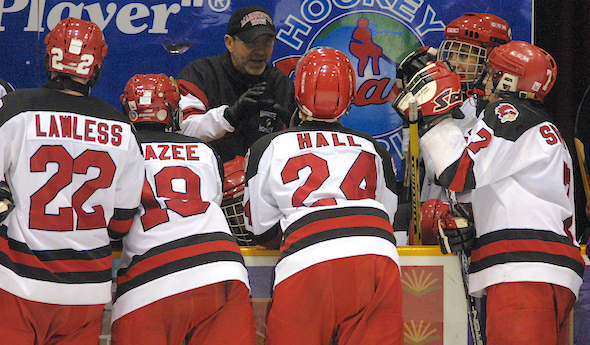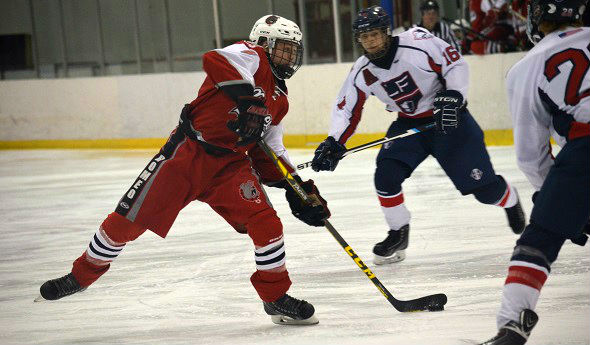
#TBT: 2002 Ends with Lights-Out Finals
July 12, 2019
By Rob Kaminski
MHSAA benchmarks editor
The Flint IMA had been to the MHSAA Ice Hockey Finals what Joe Louis Arena was to the Detroit Red Wings since it began hosting high school championships in the state in 1977.
For parts of four decades, the facility set the scene for many memorable moments on ice for scholastic skaters.
So it would have been fitting as the curtain was closing on an era March 9, 2002, if there’d been an overtime championship game or two to commemorate the last MHSAA Finals at the building.
In 2003, the MHSAA Semifinals and Finals would move to Compuware Arena in Plymouth – now USA Hockey Arena – where the event has been played ever since.
There would be no overtimes during the IMA’s swan song, but the arena wasn’t about to let go without a fight. Following the morning’s Division 2 Final, won by Grosse Pointe North over local qualifier Davison, things got strange.
As if by divine intervention, a significant power outage hit the Flint area between the first and second periods of the Division 3 Final, necessitating a return to the building for an encore performance that Monday.
Following is an account from then-MHSAA Assistant Director Randy Allen, administrator of the sport at that time.
 “East Grand Rapids and (Dearborn) Divine Child were between the first and second periods when the power went out at what must’ve been around three in the afternoon. Some of the house lights went on, but there was no huge generator. The power company told us it could be quite a while before the power came back, so the decision was made pretty quickly to come back Monday. (Editor’s Note: MHSAA regulations at that time prohibited Sunday competition, thus play would resume Monday)
“East Grand Rapids and (Dearborn) Divine Child were between the first and second periods when the power went out at what must’ve been around three in the afternoon. Some of the house lights went on, but there was no huge generator. The power company told us it could be quite a while before the power came back, so the decision was made pretty quickly to come back Monday. (Editor’s Note: MHSAA regulations at that time prohibited Sunday competition, thus play would resume Monday)
“Finishing the game in progress Monday was really a no-brainer, but now there were a couple of immediate challenges. First, how were we going to let people know, and second, what was going to happen to the (Detroit) Catholic Central-Marquette Division 1 game coming up later in the day?
“Well, knowing what I knew about the TV business (Allen’s background in Wisconsin included sportscasting), I grabbed one of the television reporters there, probably from Grand Rapids, and asked him to come down to the ice with me. It was totally dark; I figured once he put his camera lights on, it would get the attention of the crowd, which it did. So there’s about 2 or 3 thousand people in the arena – in the dark – and I’m standing in front of a light from a TV camera, and at the top of my voice I explain the situation and let them know we’re coming back Monday.
“Anyone wanting to come back, admission was free of charge, and we’d trust they were at the game. If they wanted a refund, they could mail their ticket stub to MHSAA and we'd send a refund. We obviously couldn’t use the box office without power. I don’t recall more than a couple dozen refund requests coming to our office later.
“Now the real challenge is the Division 1 game. Marquette very, very much wanted to go home and come back a week later. They’d been on the road all week (Marquette won a Quarterfinal in Traverse City that Wednesday). Jack (Roberts, former MHSAA executive director) was there, and he and Marquette’s AD (Scott Koski) and their superintendent debated a bit. In the end, the regulations of the day were upheld, and the game would be Monday.
“As it turned out, someone in the Marquette entourage had a contact in the Detroit Pistons front office, so the team was entertained in a suite at The Palace of Auburn Hills on Sunday night, so that was quite a happy ending from their standpoint.
“Many of the Marquette people were either in the arena or at a single hotel or two in the area, so alerting them to the change was not difficult.
“But then we started to think, ‘What about the Detroit CC people who would be driving up for their game later? Remember, social media was not as prevalent as it is today, or even the dependence on the internet.
“So, Saturday night, I sat there at the entrance to the IMA with my car running and lights on to inform the CC fans and anyone else who pulled up that the game had changed ... ‘Power’s out; game’s on Monday.’ They'd say thanks, and out they'd go. No one really got angry; there wasn’t anything anyone could do. I sat there an hour and a half with a steady stream, and shortly after the scheduled game time I called it a night.”
And, the IMA called it the end of an era, but not before hanging on for one more night, when Divine Child and Detroit CC would raise the last trophies in that building ... under the lights.
PHOTOS: (Top) Marquette was among teams that needed to stick around Flint two more days to play in the 2002 MHSAA Ice Hockey Finals. (Middle) Flint’s IMA arena.

Romeo Icers' Goal: Make More History
By
Tom Markowski
Special for Second Half
January 15, 2016
ROMEO – It’s often been said that if a school has a successful football season, that excitement generated in the fall will carry over to the other athletic programs.
 Although Romeo hockey coach Nick Badder doesn’t have any football players who were a part of the school’s Division 1 championship win in November, he’s hoping that success will breed success on the ice.
Although Romeo hockey coach Nick Badder doesn’t have any football players who were a part of the school’s Division 1 championship win in November, he’s hoping that success will breed success on the ice.
Romeo defeated Detroit Cass Tech, 41-27, at Ford Field to capture the school’s first football MHSAA title. And the hockey team is off to the best start in school history, as the Bulldogs are 12-0 and the team to beat in the Macomb Area Conference Red.
When asked if there is indeed a carryover effect, Badder initially discounted it – and then reassessed the significance.
“I wouldn’t say so,” he said at first. “It was cool for the guys to go down there (to Ford Field) and win.
“That’s our goal. It was a motivator in the beginning. It was good for (our players) to see. The school spirit was lifted, and we want to get there, too. We want the same thing.”
Should Romeo win the Division 2 hockey title this March, it would be the first time a Macomb County program won an MHSAA title in hockey since Fraser won Class A in 1983.
It’s been a steady rise for this program. Romeo lost to Warren DeLaSalle, 3-2, in a Regional Final in 2014, and last season the Bulldogs reached the Quarterfinals for the first time before losing to Grosse Pointe South, 8-2.
Badder, 26, was an assistant in the program in 2014 and took over as head coach last season.
 He said the loss to South was an important lesson to learn, for him and his players.
He said the loss to South was an important lesson to learn, for him and his players.
“We didn’t have big-game experience,” he said. “We didn’t handle the situation well. That’s what we’ve been trying to do this year. We don’t want those 9-5 type of games.”
The first order of business was to tighten up the defense. The fact that Badder returned both goaltenders from last season was a good starting point. Junior Nolan Kare has a .883 save percentage and has started every game. Sophomore Grant Williams is his backup.
Kare is not your typical goalie. He’s not afraid to speak his mind whether it’s on the ice or in the locker room.
“He really gets into the game,” Badder said. “He’s a hard worker and a great kid.”
The biggest improvement from last season’s team to this one is depth. Romeo’s first line returns intact, and center Nick Blankenburg is the catalyst. The team captain, Blankenburg doesn’t get outworked. Highly skilled and packing plenty of power despite his smaller size (5-foot-7, 140 pounds), Blankenburg sets the tone and has 19 goals and nine assists.
“Everyone on the team respects him,” Badder said. “And he’s got a bomb for a shot.”
Fellow senior Logan Jenuwine plays left wing and, just like last season, is the team’s top point-getter. He had 90 last season and has 18 goals and 20 assists in 12 games this winter.
At right wing is junior Brett Lanski. He trails only his line mates in points with seven goals and 14 assists.
 Romeo’s objective it to jump the other team quickly, grab an early lead and let its depth wear down the opposition.
Romeo’s objective it to jump the other team quickly, grab an early lead and let its depth wear down the opposition.
“That’s what we do,” Badder said. “They’re a high-flying line. We put them together late last January, and they’ve had a lot of success. We tried something different to start (this) season, but we went back to those three and that’s where they’ll stay.”
Badder lost seven seniors to graduation but said the juniors, who bring travel-team experience, have filled the gaps.
“They all can play,” Badder said. “There isn’t a guy out there who doesn’t belong. If we had an injury (last season) it would have been crippling. Not this year. Even the top guys have nights off. Someone has to pick up the slack.”
Shoring up the defense has been seniors Steven Morris and Logan Ganfield. Badder said these defensemen are his most improved players.
Parts of that strong junior class are center Jake Petry and winger Frank Ruffino.
The breakthrough the team experienced last season, capturing a Regional title, set the groundwork for this winter. Winning breeds confidence, and the Bulldogs are riding that wave.
“Our practices have been tight,” Badder said. “There’s no fooling around.
“I learned a lot last year. Everything I’ve done are the things I would want when I played.”
 Tom Markowski is a columnist and directs website coverage for the State Champs! Sports Network. He previously covered primarily high school sports for the The Detroit News from 1984-2014, focusing on the Detroit area and contributing to statewide coverage of football and basketball. Contact him at [email protected] with story ideas for Oakland, Macomb and Wayne counties.
Tom Markowski is a columnist and directs website coverage for the State Champs! Sports Network. He previously covered primarily high school sports for the The Detroit News from 1984-2014, focusing on the Detroit area and contributing to statewide coverage of football and basketball. Contact him at [email protected] with story ideas for Oakland, Macomb and Wayne counties.
PHOTOS: (Top) Romeo's Zach Peters looks for an opening against Livonia Franklin. (Middle) Romeo coach Nick Badder, center Nick Blankenburg and goaltender Nolan Kare. (Below) Blankenburg (26), Jake Petri (24), Steven Morris (36) and Kare stand strong as part of a solid defense. (Photos courtesy of Donna Peters.)

